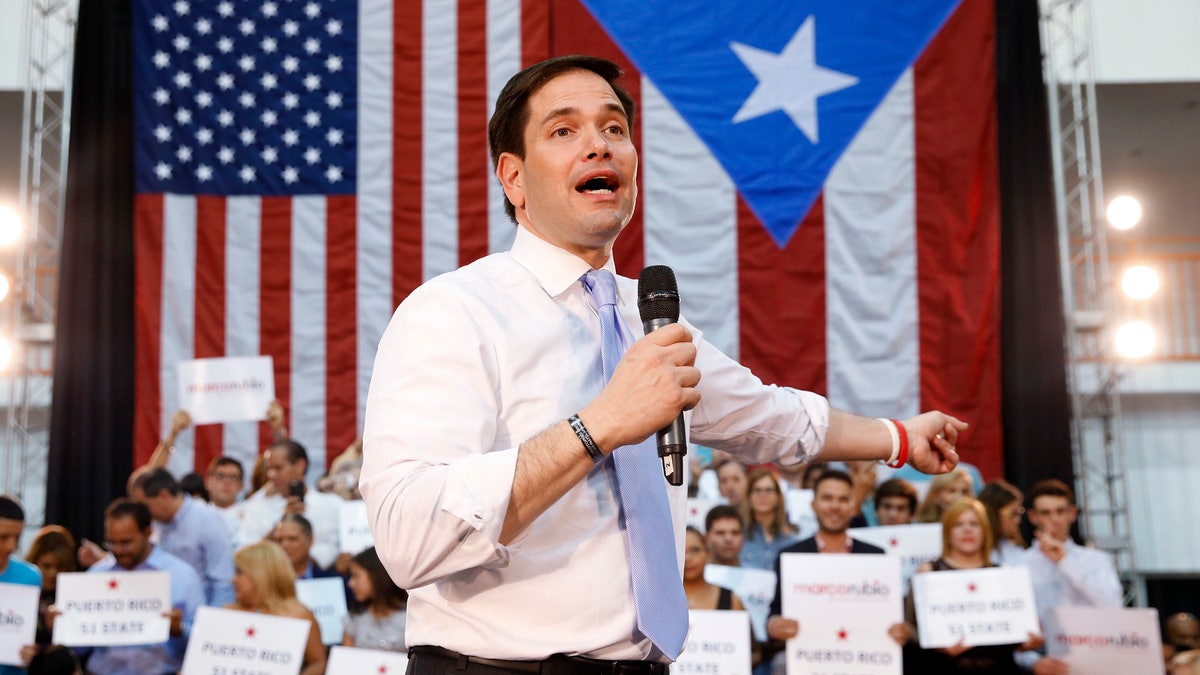
Republican presidential candidate, Sen. Marco Rubio, R-Fla., speaks in Toa Baja, Puerto Rico, Saturday, March 5, 2016. (AP Photo/Paul Sancya) (Copyright 2016 The Associated Press. All rights reserved. This material may not be published, broadcast, rewritten or redistributed without permission.)
With his sight set on Florida, Sen. Marco Rubio received a boost on Sunday when he secured his second win of this election with a landslide victory in Puerto Rico.
With more than 70 percent of the vote, the Cuban-American senator is projected to secure all 23 delegates the U.S. commonwealth has to offer in the Republican presidential primary race – taking his tally up to 149 delegates.
He trails front-runner Donald Trump’s 389, who came in second and Sen. Ted Cruz, who has 302 delegates and who came in third.
Rubio, who was campaigning in San Juan on Saturday for the second time in seven months, has only won in the state of Minnesota during Super Tuesday earlier this month. He downplayed the results in four primary races on Saturday, in which Cruz and Trump captured two states a piece.
“We’ve continued to play the delegate math in this campaign because we understand that this is going to be a very different kind of primary where the delegates are going to count,” he said on Saturday night. “We want to continue to increase our delegate total and the math only gets friendlier after tonight.”
No other candidate has had a major presence in Puerto Rico this cycle. There have been no publicly released polls.
Puerto Ricans on the island cannot cast a vote in the general presidential elections; however it can arguable make a different in the Republican primary race – especially in Rubio’s home state of Florida, where it’s winner-take-all. Florida has a sizable Puerto Rican population that could swing the battleground state.
The commonwealth has more delegates than Vermont and as many as Maine that can make an impact in the contentious GOP race. If a candidate gets more than half the votes, he gets all the delegates. If no one gets half, the delegates are divided proportionally.
The island’s three super delegates had endorsed Rubio.
"Since they can't vote in the general election, they tend to be excited about the opportunity to make an impact now, so turnout will likely be high and may be an opportunity for winners to demonstrate their appeal to Hispanics," said Justin Velez-Hagan, founder and executive director of the National Puerto Rican Chamber of Commerce.
Puerto Ricans can only vote in the general election if they reside on the mainland, and a record number of Puerto Ricans have been fleeing the island in recent years because of the ongoing economic woes.
Currently, the U.S. territory is $70 billion in debt and is on the verge of what some are calling a humanitarian crisis.
Politics in Puerto Rico generally revolves around the island's relationship to the U.S. One major party favors statehood and the other wants to maintain the current semi-autonomous commonwealth status. A small minority favors independence. The pro-statehood party has traditionally attracted Republicans and anyone taking part in the primary must sign a pledge to support the effort to become the 51st state.
Party officials said about 25,000 people were expected to take part in the vote – about 20 percent of the number who voted in 2012, due in part to a sharp reduction in the number of polling places. About 6,000 inmates cast their votes on Friday.
Puerto Rico is one of the few U.S. jurisdictions that allow inmates to vote. The only other people allowed to submit absentee ballots in the territory are members of the military.
"We have to send a message of what Puerto Rico wants, of our problems, of the help we need for the economy, and more than anything, the Republican Party here wants statehood," said Zoraida Fonalledas, the national committeewoman for Puerto Rico's Republican Party and one of the super-delegates.
The territory's Democratic primary won't be held until June, with 67 delegates up for grabs, more than four of the Super Tuesday states.
The Associated Press contributed to this report.




